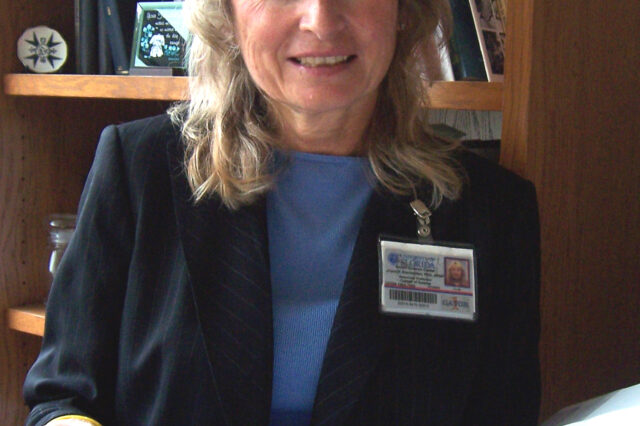Nurse researcher receives funding to assess diabetic wound healing

Joyce Stechmiller, Ph.D., A.R.N.P.
University of Florida nurse researcher Joyce Stechmiller, Ph.D., A.R.N.P., has been awarded $200,000 from the National Institutes of Health to study whether the antibiotic doxycycline accelerates healing of diabetic foot ulcers, reducing the number of amputations, decreasing costly interventions and ultimately improving patients’ quality of life.
About 20 million Americans have diabetes. Of these, 15 percent will develop lower-extremity ulcers, and about 50,000 per year will receive amputations because of ulcers.
Previous research by Stechmiller, an associate professor at UF’s College of Nursing, showed that fluids collected from chronic wounds contained high levels of pro-inflammatory cytokines proteins that can stimulate or inhibit the growth and activity of various immune cells and proteases, enzymes that aid in the breakdown of proteins in the body. However, fluids contained low concentrations of cytokines and proteases.
Stechmiller will lead the three-year study, which will assess whether diabetic foot ulcers often fail to heal because persistently high levels of pro-inflammatory cytokines present in the wound induce high levels of proteases, which then destroy factors essential for wound healing. Researchers also will attempt to describe the molecular changes that occur in diabetic foot ulcers as they heal and detect changes in the patterns of gene expression in healing diabetic wounds treated with topical doxycycline.
Stechmiller and her research team will monitor four groups of 50 patients with diabetic foot ulcers for 20 weeks, taking measurements every two weeks. Groups 1 and 2 will each have 20 participants, with one group receiving doxycycline and the other serving as a control group.
Researchers will measure the wound surface and study the activity of cytokines, proteases and growth factors at specified times throughout the 20 weeks.
To assess molecular changes and gene expression in the wound environment, researchers will measure levels of more than 12,000 messenger RNAs, or mRNAs, which carry information from DNA and serve as a template to encode the amino acid sequence of a protein. The researchers will measure mRNAs in sequential biopsies from doxycycline-treated diabetic foot ulcers in Groups 3 and 4, which will contain five patients each.
“We intend to identify gene expression patterns which correlate with the development and healing of diabetic ulcers,” Stechmiller said. “To date there are few, if any, studies that have been used to investigate this relationship.”